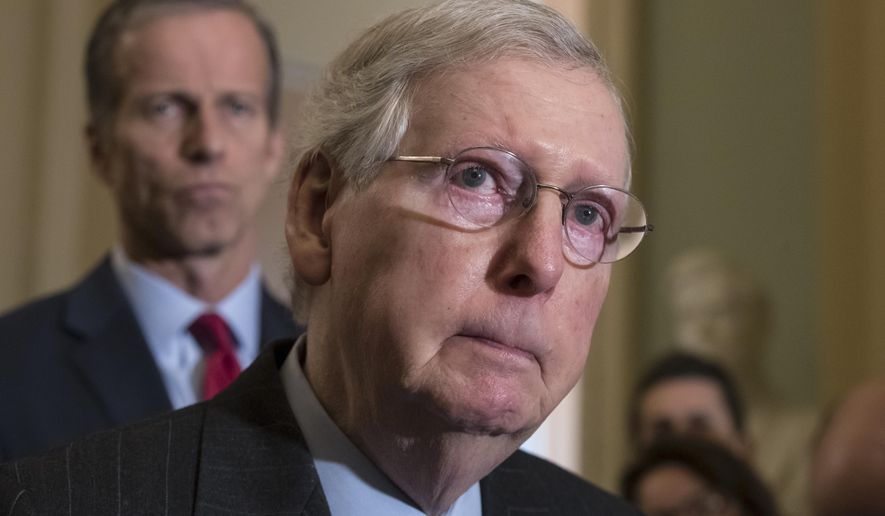Republicans backed down in their border security fight Wednesday and settled instead for a stopgap spending bill that would keep the government running through early February, avoiding a government shutdown and leaving the big fights for the new Congress.
The Senate passed the bill by voice vote Wednesday evening, and the House is expected to follow suit ahead of a Friday night funding deadline — though the White House would not commit to signing it.
Senate Majority Leader Mitch McConnell, Kentucky Republican, also said the Senate would still be in session Thursday.
“We have to see what the House does with what we just sent them,” Mr. McConnell said late Wednesday.
The short-term bill would keep dozens of departments and agencies operating through Feb. 8. Lawmakers said they had hoped for yearlong funding, but a short-term bill was better than a partial government shutdown right before Christmas.
“We need the government to remain open for the American people,” Mr. McConnell had said earlier in the day. “We need to wrap up our work for this year.”
Conservative pressure groups, though, saw the bill as a major defeat for President Trump, and liberal groups crowed over their victory, convinced they have stymied any chances for him to get additional funding for his border wall.
That had been the biggest sticking point in negotiations, with the president demanding $5 billion, Senate Democrats offering $1.6 billion and House Democrats — tilting further to the left — saying even that was too much.
The White House signaled this week that the president was no longer insisting on the full $5 billion inside the spending bill and would instead look to scrounge the money from other agencies’ budgets.
White House counselor Kellyanne Conway said Mr. Trump wasn’t caving on the wall and that he would continue to fight for the funding.
“The president is not softening his stance,” Ms. Conway said on Fox News. “He has a responsibility to keep the government moving forward, and he has [a] responsibility to get border security. If he could do it by himself, he would have done it already.”
Democrats said they will oppose any attempt to reprogram money to go toward the wall but appreciated the president’s backdown over a shutdown.
“It’s good news that the president has retreated from his demand that Congress fund the wall,” said Senate Minority Leader Charles E. Schumer, New York Democrat.
Congress has approved five of the 12 annual funding bills for 2019, which cover roughly 75 percent of the federal government’s $1.2 trillion discretionary budget, including the Defense, Labor, and Health and Human Services departments.
That left seven bills stalled, covering departments including Treasury, Commerce, Justice and Homeland Security.
Those departments have been operating on stopgap money since Oct. 1.
Leaders had hoped for quick passage in the Senate, but a group of Western-state senators held up the proceedings, at least temporarily, to try to force action on public lands legislation before the end of the year.
GOP leaders managed to keep the Western lawmakers’ demands for the lands package separate from the spending legislation, fearing such brinkmanship could open the floodgates to other lawmakers’ demands.
“The cleaner the better, I’ve always said,” said Senate Appropriations Committee Chairman Richard Shelby, Alabama Republican.
Sen. Lisa Murkowski, Alaska Republican, said late Wednesday that Mr. McConnell and Mr. Schumer have agreed to take up the lands package in the first few weeks of January.
If the stopgap bill clears Capitol Hill, it will push the spending fight into the new year, when Democrats will control the House.
Sen. Patrick J. Leahy of Vermont, the top Democrat on the Senate Appropriations Committee, said the president may regret not taking the $1.6 billion in border wall funding he negotiated with Mr. Shelby as part of an earlier version of the Homeland Security funding bill.
“I think in retrospect a lot of people are going to say it was a mistake they didn’t accept what Sen. Shelby and I put together,” Mr. Leahy said.
Rep. Nita M. Lowey, New York Democrat and the incoming chairwoman of the House Appropriations Committee, is already drawing a line in the sand on the border wall.
“When House Democrats assume control in two weeks, my primary focus will be to pass reasonable spending legislation that does not fund President Trump’s wasteful wall,” she said.
House conservatives lamented Mr. Trump’s retreat.
“If we don’t get it done now, I don’t think it’s going to happen on Feb. 8, when Nancy Pelosi’s running the House, so we need to get that done in the next two days,” said Rep. Jim Jordan, Ohio Republican.
⦁ Alex Swoyer contributed to this report.
• David Sherfinski can be reached at dsherfinski@washingtontimes.com.




Please read our comment policy before commenting.